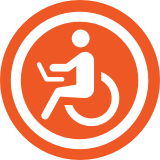We help your online business get Web Accessibility solved

Website accessibility refers to the ability of all individuals to access, comprehend, and use the content on your website without barriers. Its significance should not be underestimated, as the economic impact of web inaccessibility is estimated at around $16.8 billion.
The adherence to web accessibility standards falls under federal jurisdiction. Websites and web applications, particularly those offering public services like federal websites, are considered places of public accommodations. As a result, both public sector entities and commercial establishments are obligated to ensure equal access to their web pages in accordance with the WCAG 2.0 requirements. Moreover, private organizations that receive federal funding are also required to maintain digital accessibility.
Web accessibility is more than an ethical issue: it’s also legal and you risk fines if the justice department finds you guilty. Title III of the Americans with Disabilities Act enacted by Congress prohibits discrimination against people based on their disability. As much as the Website Accessibility legal requirement focuses on ensuring disabled working-age adults have an equal opportunity like other people, it also digresses to include online access.
The Fabel team places a special emphasis on ensuring an inclusive digital experience for all users. We confidently use tools and technologies that meet the international WCAG 2.1 standards recommended for respecting international standards. Thus, we ensure that our website complies with the highest standards of digital accessibility, providing a friendly and easy-to-use experience for all visitors.
In addition, our professional support team is always ready to answer questions and provide support in using accessibility tools. Thus, our customers can feel safe knowing that they have the necessary support to offer an inclusive and quality digital experience.
The main accessibility functionalities available for your website
Increase text size
Text spacing
Large cursor
Highlight links
Pause animations
Light contrast
Dark contrast
Invert colors
Desaturate colors
Tooltips
Reading guide
Accessible fonts
Dyslexia-friendly font
Page structure
Reset all
Screen reader
Keyboard navigation
Alternative images
Form labels
Dictionary
Headings
Form validation
Interactive elements
Automatic video playback
External link targets
Ambiguous links
Broken links
Video subtitles
Missing titles
Element focus
Website language
PDF remediation
Content moderation
Text align
Line height
Affordable prices
Live translations on-site
Smart contrast
The fundamental principles that must be followed in the development of websites and mobile applications are:
1) Perceivability - information and user interface components must be presented to users in ways they can perceive;
2) Operability - user interface components and navigation must be operable;
3) Understandability - information and operation of the user interface must be understandable;
4) Robustness - the entire content must be robust enough to be reliably interpreted by a wide range of user agents, including assistive technologies.
The Fabel team is here to assist you in all aspects related to digitalization and making your online presence accessible.




 ro
ro